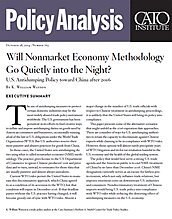The use of antidumping measures to protect certain domestic industries may be the most widely abused trade policy instrument worldwide. The U.S. government has been persistent in its efforts to find creative ways to inflate and impose antidumping duties on goods used by American consumers and businesses, occasionally running afoul of the law or U.S. obligations under the World Trade Organization (WTO). But U.S. authorities reserve their most punitive and abusive practices for goods from China.
In those cases, the United States sets antidumping duties using what is called nonmarket economy (NME) methodology. The practice gives license to the U.S. Department of Commerce to ignore Chinese producers’ cost and price data and to turn, instead, to estimates for those data that are usually punitive and almost always unrealistic.
Current WTO rules permit the United States to maintain this discriminatory approach, which China agreed to as a condition of its accession to the WTO, but that condition will expire in December 2016. If that deadline passes without the U.S. practice having changed, it will become grossly out of sync with WTO rules. Absent a major change in the mindset of U.S. trade officials with respect to Chinese treatment in antidumping proceedings, it is unlikely that the United States will bring its policy into compliance.
This paper presents some of the alternative scenarios that might unfold as the 2016 expiration date approaches. There are a number of ways for U.S. antidumping authorities to retain the capacity to discriminate against Chinese exports while claiming to be in compliance with WTO rules. However, those options will almost surely precipitate years of WTO litigation and tit-for-tat retaliation harmful to the U.S. economy and the health of the global trading system.
The policy that would best serve a strong U.S. trade agenda and the American public is to end NME treatment of China by no later than December 2016. China’s NME designation currently serves as an excuse for lawless protectionism, which not only inflames trade relations, but imposes enormous costs on downstream U.S. industries and consumers. Nondiscriminatory treatment of Chinese imports would bring U.S. trade policy into compliance with WTO rules while reducing the distorting effect of antidumping measures on the U.S. economy.

